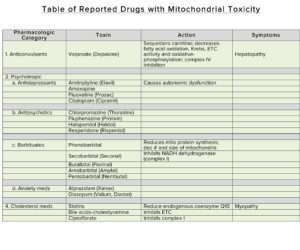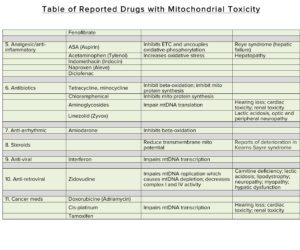What are mitochondrial diseases or disorders?
The CDC explains:
“Mitochondria are tiny parts of almost every cell in your body. Mitochondria are like the power house of the cells. They turn sugar and oxygen into energy that the cells need to work.
In mitochondrial diseases, the mitochondria cannot efficiently turn sugar and oxygen into energy, so the cells do not work correctly.
There are many types of mitochondrial disease, and they can affect different parts of the body: the brain, kidneys, muscles, heart, eyes, ears, and others. Mitochondrial diseases can affect one part of the body or can affect many parts. They can affect those part(s) mildly or very seriously.
Not everyone with a mitochondrial disease will show symptoms. However, when discussing the group of mitochondrial diseases that tend to affect children, symptoms usually appear in the toddler and preschool years.
Mitochondrial diseases and disorders are the same thing.”
Who has mitochondrial disorder?
Mitochondrial disorders can be genetic, epigenetic (changes in gene expression due to environmental exposures), or environmentally induced.
From MitoAction.org: “Infants, children, and adults may develop mitochondrial disorders. Experts in mitochondrial medicine agree there is a spectrum of the disease, ranging from mild to severe.
In adults, many diseases of aging have been found to have defects of mitochondrial function; these include, but are not limited to, Type 2 diabetes, Parkinson’s disease, atherosclerotic heart disease, stroke, Alzheimer’s disease, and cancer. In addition, many medicines can injure the mitochondria.”
“The majority of individuals with ASD and mitochondrial disorders do not manifest a primary genetic mutation, raising the possibility that their mitochondrial disorder is acquired or, at least, results from a combination of genetic susceptibility interacting with a wide range of environmental triggers. “
More studies:
Oxidative stress induces mitochondrial dysfunction in a subset of autism
Deficits in Bioenergetics and Impaired Immune Response in Granulocytes From Children With Autism
What can impair mitochondria?
Many common medications, including antibiotics and Tylenol, have mitochondrial toxicity.
“Medications have now emerged as a major cause of mitochondrial damage, which may explain many adverse effects. All classes of psychotropic drugs have been documented to damage mitochondria, as have statin medications, analgesics such as acetaminophen, and many others.”
“Medication-induced mitochondrial damage and disease.” Mol Nutr Food Res. 2008 Jul;52(7):780-8. doi: 10.1002/mnfr.200700075.
Use of these medications at time of vaccination may lead to vaccine injury. Graphs from MitoActio.org. (Note: this is not a complete list of medications or environmental exposures that can impair mitochondria.) Please see our Tylenol page. While the science is well-established, it has not yet been incorporated into the standard of medical care. See Regulatory Vacuum.



NOTE to item 14. Immunizations shown on graph. “No scientific data on oxidative-phosphorylation adverse effects” does not mean such adverse events don’t exist, it means that at the time the graph was made, there was no “data,” meaning no studies had been done. However, many studies indicate vaccine components can impair mitochondria, including aluminum adjuvants. Please see the Aluminum page.
2014 study Oxidative stress and mitochondrial dysfunction in aluminium neurotoxicity and its amelioration: a review states:
“Being involved in the production of reactive oxygen species, aluminium may impair mitochondrial bioenergetics and may lead to the generation of oxidative stress. In this review, we have discussed the oxidative stress and mitochondrial dysfunctions occurring in Al neurotoxicity. In addition, the ameliorative measures undertaken in aluminium induced oxidative stress and mitochondrial dysfunctions have also been highlighted. “
Mitochondrial disorder and vaccine injury
It has been established that impaired mitochondria impacts vaccination response and can lead to injury.
In 2004, when autism rates were 1 in 500 (rather than 1 in 50) the Immunization Safety Review Committee Board on Health Promotion and Disease Prevention stated:
“The committee’s conclusion did not exclude the possibility that MMR could contribute to autism in a small number of children, given that the epidemiological studies lacked sufficient precision to assess rare occurrences. Thus it was possible that epidemiological studies would not detect a relationship between autism and MMR vaccination in a subset of the population with a genetic predisposition to autism. The biological models for an association between MMR and autism were not established, but nevertheless were not disproved.”
The Hanna Poling case on CBS News:
“There’s no denying that the court’s decision to award damages to the Poling family puts a chink — a question mark — in what had been an unqualified defense of vaccine safety… If Hannah Poling had an underlying condition (Mitochondrial Disorder) that made her vulnerable to being harmed by vaccines, it stands to reason that other children might also have such vulnerabilities.”
“Federal authorities for the first time conceded that there is a connection between a child’s autistic symptoms and the vaccines she received as an infant. Medical evaluators at the Department of Health and Human Services concluded that the child had been injured by the vaccines and recommended that her family be compensated for the injuries. The panel stated that the child had an underlying mitochondrial disease that was aggravated by the vaccines, causing the autistic like symptoms.” http://www.umdf.org/site/apps/nlnet/content2.aspx?c=jtJWJaMMIsE&b=4090771&ct=5315239
Julie Gerberding, Former director of the U.S. CDC told CNN’s Dr. Sanjay Gupta: “If a child was immunized, got a fever, had other complications from the vaccines, and was pre-disposed with the mitochondrial disorder, it can certainly set off some damage (including) symptoms that have characteristics of autism.”
Gerberding states that this dysfunction is “rare”, but other scientists believe 1 in 50 individuals may have a mitochondrial dysfunction.
This recent Vaccine Injury Compensation SIDS case found: “In this case, I have concluded, after review of the evidence, that it is more likely than not that the vaccines played a substantial causal role in the death of J.B. without the effect of which he would not have died. The role of inflammatory cytokines as neuromodulators in the infant medulla has been well described and is likely the reason for a significant number of SIDS deaths occurring in conjunction with mild infection. I have concluded that it is more likely than not that the vaccine-stimulated cytokines had the same effect in this vulnerable infant during sleep. Accordingly, petitioners are entitled to compensation. “ https://ecf.cofc.uscourts.gov/cgi-bin/show_public_doc?2013vv0611-73-0
Talk About Curing Autism (TACA) states:
In 2010, a groundbreaking study by researchers at University of California Davis showed that 80% of the children with ASD enrolled in their study had blood tests indicating mitochondrial dysfunction.
* Biochemical evidence of mitochondrial dysfunction in post-mortem brain tissue of children and adults with ASD
* Markers of mitochondrial dysfunction on brain MR spectroscopy scans of children and adults with ASD
* Mitochondrial and immune abnormalities in children with ASD
The cumulative evidence now suggests that mitochondrial dysfunction is present in a substantial portion of those with ASD and that it may be an important factor that contributes to the symptoms of ASD.
Triggers of mitochondrial dysfunction in ASD
Many different types of triggers can lead to mitochondrial dysfunction, and these may be either genetic or environmental, or a combination of both. Some of the triggers include
* gene mutations,
* shortages of key vitamins and minerals in the diet,
* certain chemicals, heavy metals, and drugs,
* certain bacteria and viruses,
* stress
Miscellaneous Studies
- “The most important mechanism by which mercury causes toxicity appears to be mitochondrial damage via depletion of GSH” Mercury toxicity and neurodegenerative effects.
- “Additionally, we find a five-fold increase in the levels of oxidant damaged mitochondrial DNA bases and increases in the levels of mtDNA nicks and blunt-ended breaks.” Thimerosal-Derived Ethylmercury Is a Mitochondrial Toxin in Human Astrocytes: Possible Role of Fenton Chemistry in the Oxidation and Breakage of mtDNA.
-
“In 2003, Skladal et al. estimated that the minimum birth prevalence of inherited mitochondrial disorders (via mitochondrial DNA and nuclear DNA) is >1 in 5000 births [11].” https://www.ncbi.nlm.nih.gov/pmc/articles/PMC3099432/
- “Many diseases have been identified as caused by mitochondrial dysfunction, and many pharmaceuticals have been identified as previously unrecognized mitochondrial toxicants. A much smaller but growing literature indicates that mitochondria are also targeted by environmental pollutants. We briefly review the importance of mitochondrial function and maintenance for health based on the genetics of mitochondrial diseases and the toxicities resulting from pharmaceutical exposure. We then discuss how the principles of mitochondrial vulnerability illustrated by those fields might apply to environmental contaminants, with particular attention to factors that may modulate vulnerability including genetic differences, epigenetic interactions, tissue characteristics, and developmental stage.” Mitochondria as a Target of Environmental Toxicants
- Genetic modifications associated with ketogenic diet treatment in the BTBRT+Tf/J mouse model of autism spectrum disorder.
“In this report, we demonstrate the ability of Al to trigger mitochondrial dysfunction and ineffective adenosine triphosphate (ATP) production. ” Aluminum-induced defective mitochondrial metabolism perturbs cytoskeletal dynamics in human astrocytoma cells
-
Study confirms mitochondrial deficits in children with autism
- NOTE from InformedChoiceWA editors: MMR is an attenuated (weakened) live virus vaccine. Any symptom/adverse event of a disease is also biologically plausible with its vaccine counterpart.
- Rubella Virus Infection [including by vaccine strains] Results in Partial Opening of the Mitochondrial Permeability Transition Pore Activation of the Mitochondrial Apoptotic Signaling Platform during Rubella Virus Infection.
- “Rubella might still cause autism, even in vaccinated populations.” Does Rubella Cause Autism: A 2015 Reappraisal?” NOTE from InformedChoiceWa Editors: At least as far back as 1994, the IOM has acknowledged that it’s biologically plausible for live vaccine strains of viruses to cause the same adverse reactions as their wild counterparts. It has long been known that Rubella is associated with autism. Measles with encephalitis. Mumps with autism. Why then would ANYONE deny that the live trivalent MMR vaccine–with all three viruses–is capable of causing autism? Especially when millions of parents worldwide have reported — and are still reporting — symptoms of extreme infection and immune reaction following administration of MMR, leading to regression into autism? If biological plausibility is known, but only epidemiological studies designed which may lack the ability to reveal associations are done or considered, how can the claim be made that vaccines don’t cause autism? See https://www.nap.edu/catalog/2138/adverse-events-associated-with-childhood-vaccines-evidence-bearing-on-causality
- Association study of mitochondrial genetic polymorphisms in asthmatic children.
-
Mitochondrial Disease in Autism Spectrum Disorder Patients: A Cohort Analysis
- “Thimerosal at low nanomolar (nM) concentrations induced significant cellular toxicity in human neuronal and fetal cells.” Mitochondrial dysfunction, impaired oxidative-reduction activity, degeneration, and death in human neuronal and fetal cells induced by low-level exposure to thimerosal and other metal compounds
- The Link Between Mitochondrial Diseases and its Neurological Symptoms
- MTHFR Gene Description https://ghr.nlm.nih.gov/gene/MTHFR
- “The conference centered entirely upon the rare congenital/inherited forms of mitochondrial disorders that are first diagnosed in infancy and which comprise about 10 – 15 % of cases of known mitochondrial disorders. Nothing was said by the presenters about the 85 – 90 % of acquired forms of mitochondrial disorders, which could, of course, be preventable if knowledge of the root causes were transmitted to us physicians and patients.” Iatrogenic Drug and Vaccine-induced Mitochondrial Disorders
